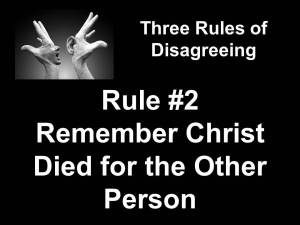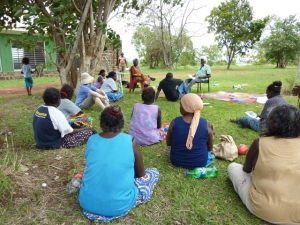
We didn’t get a recording of this past Sunday’s sermon so here is a recreation of that sermon in text form from my notes. Other recordings from the series can be found on the Orchard Community Church website.
“Dealing with Disagreements” – Romans Chapter 14.
We have a problem with disagreeing in our culture. The problem is not necessarily that we have disagreements – those are inevitable – the problem is that we don’t know how to disagree. All you have to do is see a few political commercials, debates or speeches to know that art of respectful disagreement in our culture has been completely lost and we have somehow slid into the depths of thinking that disagreeing involves making the other person look as bad as possible. I found two quotes, related to disagreements (though not necessarily to politics), that are: “It’s ok if you disagree with me, I can’t force you to be right” and “I’d agree with you, but then we’d both be wrong.” While funny, these aren’t very helpful when it comes to engaging in a proper disagreement! We can’t just start from the position that we are right and everyone else is wrong.
Look around at the people of Orchard Community Church (or most churches for that matter). Just a week or so ago we had a New Membership Class with about 20 people there. The youngest was around 10 years old and the oldest was just over 80. Our church is diverse in ages, backgrounds, and prior church experiences. This diverse group of people is brought together by the gospel of Jesus Christ. In this unity, though, there will still be disagreements. I’m not talking about things that are right and wrong, sinful or righteous. Anything that is specifically called sin by Scripture is sin – I’m not talking about disagreements on things such as this. But there are things that are not specifically taught in Scripture and that we may have no clear guidance one way or the other from God. They may be things from our traditions or our backgrounds or maybe matters of personal preference. When we come together as the church, these things can threaten to undermine the unity that is so essential for our mission of living and spreading the gospel in this world.
Romans 14 is about dealing with disagreements in the church. Take a moment to read Romans 14 for yourself. Paul is specifically writing about disagreements between Christians about spiritual things, but I think there are principles here which apply to other disagreements as well.
First, we need to know a few things about the church in Rome. As the capital city of the Roman empire, it was extremely diverse and was a true melting pot of cultures and religions. The Christians in Rome would have been very diverse as well. As we study what Paul writes about disagreements, it is important to note that the “weak” people he writes about are not people who would say you have to do certain things to be saved or to be more righteous. Paul had no patience with people who believed this or taught this. It undermined the gospel and the work of Christ on the cross. The book of Galatians speaks strongly against such people. There is also no mention of the “weak” people struggling with sin. The times he mentions eating meat or drinking wine do not mention that these people struggled with some sort of sinful addiction to these things, just that they believed that they should not eat meat or not drink wine in order to bring glory to God. I also don’t believe this was a Jew vs. Gentile disagreement – though we have seen a lot of evidence of that throughout Romans. In the book of 1 Corinthians, Paul writes about the problem between Jews and Gentiles regarding meat that had been sacrificed to pagan idols. The difference is that Rome had a large Jewish population and so kosher meat (approved for eating by Jewish people) would have been readily available. All this is to say that we really don’t know specifically what disagreement Paul has in mind, but it appears to be general ideas about what should or should not be a part of the Christian life in order to bring glory to God. These differences came because of their great diversity and threatened to cause problems in the church.
Throughout the passage, Paul uses the terms “weak” and “strong” about the faith of the people on either side of this disagreement. Some had matured and grown stronger in their faith and realized that eating or not eating certain foods had no bearing on their relationship with God. They also realized that they didn’t have to celebrate certain days in order to be holy. Those who were weak in their faith needed these things as a sort of crutch in their relationship with God. It’s like when a child learns to ride a bike and uses training wheels. We don’t mock a four-year-old for riding with training wheels because that is appropriate for where they are at in their bicycle training. If we turned on the Olympics and saw one of the riders using training wheels we might think a little differently!
Romans 14 is remarkable for the fact that Paul is dealing with seemingly insignificant issues that were threatening to divide the church, yet he deals with these things using deep truths about the nature of God and the work of the cross. This is a great example for us when dealing with anything in our lives. We need to reflect on Who God is and what He has done and then live in light of that.
As you study Romans 14, it is tempting to focus on contemporary issues like whether or not drinking alcohol is OK for Christians or whether or not we should go to R rated movies and so forth. It would be foolish of me to give teaching specific to these issues because as soon as I did people would either judge others in agreement with me or judge me… either way, it would actually cause the very problem that Paul is trying to write against in Romans 14.
So, with that lengthy introduction…. Here it is, three rules of disagreeing.
 Rule #1: Remember You Are Not God (verses 1-8)
Rule #1: Remember You Are Not God (verses 1-8)
I truly believe that lots of disagreements would be avoided if we all took a deep breath and realized that the job of being “God” is already filled by the most qualified person and that person is not us. In verses 1-4, Paul talks about how the “other person” is accepted by God. In the church when we disagree with someone we need to remember that God has accepted that person based on the finished work of the cross. That person belongs to God and is God’s servant (verse 4). We have no right refusing to welcome or accept someone whom God has accepted. To do so is to put ourselves in God’s place. In these verses, the specific things mentioned are that those who were weaker in their faith ate only vegetables while those who were stronger in their faith also ate meat. Notice that Paul doesn’t get into the argument and play the referee. He simply speaks to both parties and says, in effect, “Who do you think you are? You are not God!”
Then, in verses 5-8 he says that we are all to live for the glory of God. If one person believes that they bring glory to God in their life by not eating meat then praise God! If the other believes they can bring glory to God by eating meat then praise God! The problem comes when each looks at the other and says, “wait a minute, YOU have to do this MY WAY.” The weak judge the strong and say that they are sinning and the strong judge the weak and tell them that they must do things that the weak may not be comfortable with.
Notice verse 5 – “One man considers one day more sacred than another; another man considers every day alike. Each one should be fully convinced in his own mind.” Part of our problem today is that people have really strong convictions based on very weak effort. All too often we argue about things and when challenged why our way is right the only answer we can come up with is “that’s the way we’ve always done it” or “it just makes sense to me.” Paul says that each one should be “fully convinced.” We need to question our convictions. Test them against Scripture. Reason through them and ask why we believe what we do about these things. I believe God is more greatly glorified through two people who lovingly disagree over how to live for God’s glory but have thoroughly examined their convictions than two people who are in complete agreement but have never thought through what they believe about that matter.
In verses 6-8 Paul says that we are to do everything for the glory of God. We may disagree about how we should bring glory to God, but when we keep the focus on God’s glory rather than us and our differences, a lot of these disagreements would be left behind.
 Rule #2 – Remember Christ Died for the Other Person (and you didn’t) (verse 9-18)
Rule #2 – Remember Christ Died for the Other Person (and you didn’t) (verse 9-18)
Verse 9 says that Jesus Christ is qualified to be the Lord of everyone because He died on the cross and rose from the dead. When in a disagreement, ask yourself, “did I die on the cross for this person and then raise from the dead promising them eternal life if they believe in me?” If the answer is “no” then you are not qualified to judge your brother or sister about these matters. In the end we will all be held accountable for our actions and, though this may come as a shock to some, it will not be us sitting on the judge’s seat.
In verses 13-18, Paul gives us one of the most important pieces of relationship advice that we can ever hear. Basically, in verse 13 he says to quit thinking about whether the other person is right or wrong and instead look at what you are doing. Are you trying to help that person or not? Are you doing everything you can to seek peace or not? So often we spend so much time with the excuse of “but the other person did…” and Paul is saying to stop focusing on your perception of their faults (which is flawed anyway) and instead focus on what you are doing to help. Often in a disagreement we allow our own pride to make the situation worse.
In verses 14-15 and then again later in verse 21 Paul gives some pretty strong teaching. It almost appears like he is saying that if a fellow Christian thinks something is wrong for them, then it is wrong for everyone. This would basically make us all slaves to the weakest members in the church. I do not believe this is what Paul is saying and here’s why. First, the language he uses is not of causing someone to struggle or question their faith. In verse 15 he says that the exercise of our freedoms should not “destroy” someone. Then, in verse 21 he mentions that it is better not to do things that cause someone to “fall”. These are strong words and would be out of place when applied to someone seeing someone else doing something that they think is questionable (like drinking wine in public). This is how I hear this passage commonly applied today, but I don’t thing that is what Paul is saying. The language Paul is using is most commonly used by him to talk about someone’s eternal destiny or falling into grievous sin. So what are we to make of this? I believe that Paul is writing to a situation where those who were “strong” in their faith were flaunting their freedom and even trying to force those who were weaker to participate in things that the weaker were unsure about. To pressure someone into doing something they think is sin would be (according to verse 23) to cause them to sin. This is a serious issue and this is what Paul is writing against.
This all falls under the general category of not being judgmental because we didn’t die on the cross and raise from the dead. The weak must not look in judgment on the acts of those that are strong and condemn them and the strong must not look down on the weak and condemn them. We must instead ask ourselves if we are living the sacrificial love that was shown to each of us on the cross.
 Rule #3 – Remember the Mission (Verses 19-34)
Rule #3 – Remember the Mission (Verses 19-34)
In verses 19-20, Paul writes that we should focus on something greater and not “destroy the work of God” for unimportant things. I believe Paul is employing a bit of sarcasm here. He is basically saying, “Are you really going to undermine the cause of the gospel of Jesus Christ in the world for the sake of food???” Let it go! Stop it! Don’t get hung up on these things! If what you do is causing someone distress then don’t do it!
Paul ends with specific instructions to the weak and the strong. In verse 22 he addresses the strong and tells them not to flaunt their freedom. He tells them to keep what they think between them and God. In other words, it is not their job to convince their weaker brother that they wrong. Then, in verse 23 he addresses the weak and tells them that if they think something is wrong, they should not do it because if you do something you believe is wrong (even if it isn’t) then you are sinning. The emphasis, though, is on them and their convictions about what they are doing – not on using their conviction to judge others.
If in the church we would focus more on the mission of the gospel and less on our own petty differences, a lot of things would be seen to be not important enough to allow them to undermine the overall mission of the church.
Conclusion
So how do we apply all this to us? First, we cannot ignore Paul’s use of the terms “weak” and “strong.” We need to ask ourselves if we are living a strong faith or a weak faith and if our weakness or strength is causing us to be judgmental toward others. The stronger we are in our faith, the more we will realize that it is not our job to judge what others are doing in their lives as they seek to bring glory to God. Again, I am not speaking about things that are clearly sinful. Scripture tells us that we are to lovingly help a brother or sister in Christ who is in sin, which may involve some difficult confrontation if necessary. This is not what this chapter is about. These are things where we have no right to declare them right or wrong – they are clearly matters of preference.
Second, those who hold strongly to convictions about right and wrong that are not specified in God’s Word must understand that this is evidence of weakness in faith, not strength. It is fine to use some training wheels or a crutch in your relationship with God when necessary. Just don’t use your crutch to beat up other believers.
Third, those who have matured and realize their freedom in Christ should never, ever kick the crutch out from another believer’s hands. This is not they way to teach someone to be strong and only does more damage.
Finally, we should see everything in our lives through this new lens of faith – the lens taught in Romans 1-11. God is God and we are not. Christ is qualified to be the Lord and the judge because He died on the cross and rose from the dead – we didn’t. There is an important mission that God has been carrying out since the beginning and throughout all history to save people from their sins and to bring them to be His people, His kingdom, with Him forever. Let’s keep our sights there and not allow ourselves to be sidetracked by lesser things.
The church is diverse and must be diverse to display the glory of God. The only way to navigate this diversity and deal with the inevitable disagreements along the way is to focus on what is most important – the glory of God and the mission of the gospel.

 “But God demonstrates his own love for us in this: While we were still sinners, Christ died for us.” – Romans 5:8
“But God demonstrates his own love for us in this: While we were still sinners, Christ died for us.” – Romans 5:8 “I am the gate; whoever enters through me will be saved. He will come in and go out, and find pasture. The thief comes only to steal and kill and destroy; I have come that they may have life, and have it to the full.” – Jesus (John 10:9-10).
“I am the gate; whoever enters through me will be saved. He will come in and go out, and find pasture. The thief comes only to steal and kill and destroy; I have come that they may have life, and have it to the full.” – Jesus (John 10:9-10).







 Imagine two people, one is obviously sick while the other looks and feels healthy but, unknown to them, has a treatable but serious form of cancer. The first person will probably seek help by going to the doctor or getting the appropriate medicine. The second will probably do nothing. The same help is available to both but only one will accept it. Why? Because although both are in need, only one is aware of this need.
Imagine two people, one is obviously sick while the other looks and feels healthy but, unknown to them, has a treatable but serious form of cancer. The first person will probably seek help by going to the doctor or getting the appropriate medicine. The second will probably do nothing. The same help is available to both but only one will accept it. Why? Because although both are in need, only one is aware of this need.